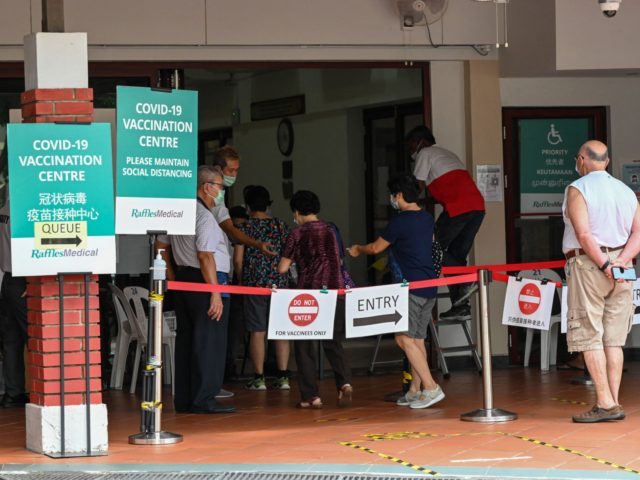Singapore’s government — which currently provides free medical care to coronavirus patients — announced Monday it will no longer cover the costs of coronavirus-related medical bills for people who choose not to receive a Chinese coronavirus vaccine starting next month, Australia’s Seven News reported Wednesday.
“[F]rom 8 December 2021, we will begin charging COVID-19 [Chinese coronavirus] patients who are unvaccinated by choice,” Singapore’s Ministry of Health said in a press release issued November 8.
“This will apply to all unvaccinated COVID-19 patients admitted on or after 8 December 2021 to hospitals and CTFs,” the ministry clarified.
“COVID-19,” or the Chinese coronavirus, is the name of the disease caused by SARS-CoV-2, which is a type of coronavirus. “CTF” stands for “Covid-19 Treatment Facility.” The sites provide “medical capabilities and resources, including oxygen supplementation, to safely manage patients who may be at risk of developing severe illness,” according to the Singapore-based Straits Times.
Singapore’s Health Ministry said on November 8 it would continue to cover the full cost of “COVID-19 medical bills for those who are ineligible for vaccination … i.e. children under 12 years old or medically ineligible persons.”
Singapore’s government currently pays all costs tied to coronavirus-related medical bills for all Singaporeans. The city-state extends this financial aid to Singapore’s permanent residents and long-term residence pass holders, with the exception of individuals “who tested positive or had onset of Covid-19 symptoms within 14 days of arrival in Singapore after overseas travel.”
The Singapore Ministry of Health said Monday it decided to withdraw free coronavirus medical treatment for people unvaccinated against the disease because the demographic currently comprises “a sizeable majority of those who require intensive inpatient care, and disproportionately contribute to the strain on our healthcare resources.”
The Republic of Singapore is a sovereign island city-state in Southeast Asia with a population of nearly 6 million. Government data published on November 8 revealed 85 percent of Singaporeans were fully vaccinated against the Chinese coronavirus.
“Both first and second doses of the Pfizer-BioNTech/Comirnaty, Moderna and Sinovac vaccines are currently being administered,” the Straits Times reported on November 10.
“Those eligible for booster doses are also being invited to receive their third shots. As at Nov 8, 18 per cent of Singapore’s population have received boosters [sic],” the newspaper noted.
“Booster” shots are additional doses of a vaccine a person receives after he or she has already completed a full dosage of the inoculation.
Both Pfizer-BioNTech/Comirnaty and Moderna produce coronavirus vaccines based on new mRNA technology, while China’s state-made Sinovac is based on more established inactivated virus technology. The mRNA vaccines inject part of the Chinese coronavirus’ genetic code into a person’s body, thus triggering the production of viral proteins. This process trains the recipient’s immune system to attack the Chinese coronavirus should it encounter it in the future. Inactivated virus vaccines inject killed viral particles into a recipient’s body to expose the person’s immune system to the virus.
Both Pfizer and Moderna are multinational pharmaceutical and biotech corporations based in the U.S. Pfizer partnered with the German biotech firm BioNTech and the Chinese company Fosun Pharma to develop a coronavirus vaccine named “Comirnaty.” Sinovac is a Chinese state-owned biopharmaceutical company that produces a Chinese coronavirus vaccine known as “Sinovac-CoronaVac.”

COMMENTS
Please let us know if you're having issues with commenting.